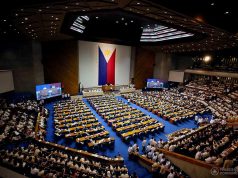Philippines calls for ‘needs-based’ priority system for climate finance

THE Environment Secretary called access to climate finance an urgent matter and pressed the government to work towards international agreements that will unlock funding to help address the climate “emergency” faced by developing countries.
“Without global transformation and adequate financial resources dedicated to solving the climate change problem, which has reached emergency status, any agreement will be meaningless,” Department of Environment and Natural Resources Secretary Maria Antonia Y. Loyzaga said in a statement issued by the Climate Change Commission (CCC).
Under the United Nations Framework Convention on Climate Change, the CCC has engaged technical experts in a dialogue that hopes to address the needs of developing countries for lowering greenhouse gas emissions and climate-resilient development.
The previous administration has staked out a position that the developed world, which has produced the bulk of greenhouse gas emissions as it industrialized, must provide aid to developing countries facing most of the consequences of climate change.
“Urgent delivery of needs-based climate finance on loss and damage is crucial to transformative climate actions by at-risk developing nations. Gone are the days of empty commitments, now is the time to implement, to deliver action with results,” CCC Vice Chair and Executive Director Robert E.A. Borje said.
Mr. Borje said the dialogue is an “opportunity to advance inclusive climate finance, driven by a process that ensures balanced geographical participation, particularly of developing states in the Asia-Pacific region.”
He said the dialogue also allows participants “to be influenced by the best available science, to rectify past mistakes on not considering uncertainties, costing for externalities, and affording ample space to innovate, so that rehabilitation is not the norm.”
Mr. Borje said President Ferdinand R. Marcos, Jr. has declared climate change a priority and expressed his support for climate-mitigation efforts.
“Under Mr. Marcos’ administration, there is a proposal to increase national budget allocation for climate change-related programs, projects and activities,” Mr. Borje said.
“The Philippines will continue to do its part, while pursuing stronger collaboration with partners and stakeholders toward climate justice,” he added.
Mr. Borje called for pragmatic solutions, noting that the Philippines is expected to be one of the countries bearing the brunt of the climate crisis.
The Philippines is considered the fourth most vulnerable country to climate change, according to the Global Climate Risk Index.
“This is what we mean by build right at first sight: to build justly and efficiently at first sight, with a long-term horizon in mind. Our discussions will go beyond dollars and cents,” Mr. Borje said.
“There will be recommendations for actions that will affect the lives and livelihood of nations. Today is an opportunity to get things right. To secure climate equity and justice for all,” he added.
The Ad Hoc Work Programme on New Collective Quantified Goal on Climate Finance created under the Paris Agreement is tasked to conduct four technical exchange dialogues annually until 2024. — Luisa Maria Jacinta C. Jocson



